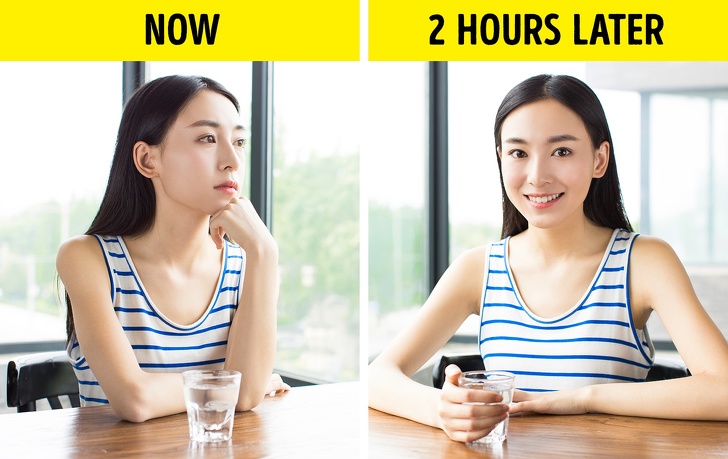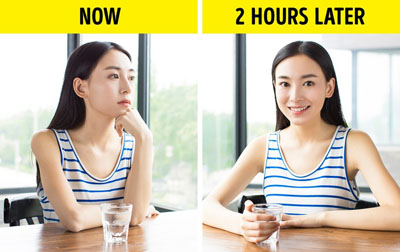A Japanese scientist named Yoshinori Ohsumi discovered a principle of eating that helps us stay young and healthy. It was so innovative, Ohsumi received The Nobel Prize in Physiology or Medicine in 2016.
When we starve for some time, the cells recycle everything old and useless and become young. This process is called autophagy. Here is a system that will help you use this process to your advantage. You will only need to change one dieting habit.
We have studied the different types of interval fasting and chose the simplest and safest diet plan that will start the autophagy process and keep you young and fit.
What is a diet window?

The time in which we eat is called the diet window. Someone who wakes up at 7 A.M. and has breakfast in an hour opens this window at 8 A.M. If they have dinner between 8 P.M. and 10 P.M., this window is 12-14 hours every day.
Before, people believed that they should eat more often but in small amounts, because otherwise, the body would store the fat.
According to research done in 2017, those who eat from 8 A.M. to 8 P.M. are less healthy than those who eat from 8 A.M. to 2 P.M. When the diet window is narrower, the risk of having diabetes, anemia, or obesity is lower.
What happens if you narrow down your eating window?

There have been many studies about the connection between the decrease of a diet window and the levels of cholesterol, sugar in the blood, appetite, and weight. In 2017, scientists tested their ideas on people and narrowed their eating windows to 12, 8, 6, or 4 hours. All of the people ate the same food as usual without choosing any special foods. The number of calories in the control groups were the same.
The time restriction helps to lose weight. This is because the body burns more fat at night and the feeling of hunger decreases, and so does the amount of used energy.
The small metabolic window is good for health in general for the following reasons:
- The protection from UV-light, skin cancer, and aging increases.
- The risk of breast cancer decreases.
- The blood pressure decreases.
- The risk of heart conditions decreases.
- The quality of sleep becomes better.
Why is the time of eating so important?

It’s important not to just narrow the diet window, but also to choose the right time to eat. Everybody has their own circadian rhythms: the biological clock connected with the change of day and night.
In the morning, the production of cortisol starts, and we have energy and an appetite. In the evening, melatonin is produced which means the body is preparing itself for sleeping and slowing down the internal processes — including digestion.
- If you eat in the evening, the biological clock loses its rhythm.
- You are tired in the morning, meaning the cortisol level is low.
- During the day, the body wakes up.
- In the evening, if the cortisol level is increasing, we are active and hungry even though the body needs to sleep.
- As a result, the risk of diabetes, obesity and depression increases.
How to build your schedule

To have the right biological schedule, you need to:
- Wake up at 6 A.M. to 7 A.M. or when it’s light outside.
- Have breakfast 30-60 minutes after waking up.
- Start work 2-3 hours after waking up.
- Eat more for breakfast than for lunch.
- Narrow the diet window to 6-8 hours, with no change in the number of calories.
Scientists learned that those who choose a bigger breakfast and a smaller lunch lost weight more quickly than those who did it vice versa.
The 9-hour window is a rough schedule to follow: Wake up at 7 A.M., then have a good breakfast at 8 A.M., eat less at noon, and after that, eat dinner at 4 A.M. And if you can, don’t have dinner at all.
How to fight the hunger

Of course, many people worry about fighting hunger the entire evening. The scientists that studied this phenomenon did too. As it turns out, the hunger hormone is tied to our circadian rhythms. The hormone level peaks in the blood at 8 A.M., 1 P.M., and 7 P.M.
After every peak, no matter if the person ate something or just drank tea, 2 hours later, the flow of the hormone stops. This means that you shouldn’t trust the feeling of hunger that makes you eat every three hours. Scientists claim that over time, the body will get used to taking big breaks between eating and the feeling of hunger will be weaker. And if you eat more often, the hunger will be stronger.
It might be quite hard to narrow the diet window in the beginning. During the first few days, you will feel like you could eat an elephant after 7 P.M.! You can get through this phase by eating vegetables and fruit. A week later, the body will get used to it, your appetite will be lower, your sleep will be better, and your mood in the morning will be better.
As you can see, there is nothing really hard about this diet plan. Here is what you need to do:
- Count how many hours your diet window is (if your breakfast is at 8 A.M., and your dinner is at 8 P.M, the diet window is 12 hours).
- Narrow your window down to 6-8 hours, and move it to the morning (for example, from 8 A.M. to 2-4 P.M.).
- Don’t count calories! After 1-2 weeks, the body will get used to this and you will feel great in the morning.












